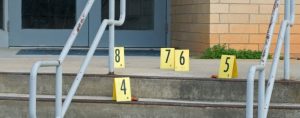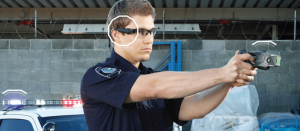Chris Connors, CEO of Shooter Detection Systems (SDS), stressed the importance of having zero false alerts with shot detection technology. SDS’s solution, dubbed the Guardian Indoor Active Shooter Detection System, boasts zero false alerts during its more than 16 million hours of use across the world. “It’s a major event when the sensor goes off, and we have to be right every time,” Connors said.
COPsync911 uses teacher- and staff-driven school safety tools to help improve communication between law enforcement and schools and reduce law enforcement response times during a violent situation.
ShotPoint, from Databuoy, is happy to run in the background of existing security technologies, according to company president and founder Kathleen Griggs. The shot location technology is designed to run in the background of existing security solutions, making it easy to implement and deploy. In an interview with 21st Century State & Local, Griggs explained that her company’s patented sensor mesh approach sets it apart from competitors.
SST’s SecureCampus uses sensors, the cloud, and occasionally trained experts to detect gunshots and then notify the police.
Geographic information system software company Esri has pledged to donate $40,500 worth of data collection and sharing software to winners of the National Institute of Justice’s Research and Evaluation on Drugs and Crime grant program for combating opioid and heroin abuse.
Axon, the body camera division of police technology firm Taser, recently released a gun holster sensor designed to solve the problem of turned-off body cameras.
Criminal justice professionals can now engage in discussion, collaboration, and knowledge sharing thanks to the Data Justice Network.
In 2016, more than 130 police officers were killed in the line of duty in the United States, which is the highest number of fatalities on the job in five years. Every day police officers around the country put themselves in harm’s way; luckily new advancements in technology are helping to reduce deaths and injuries among police.
The police department in Methuen, Mass., hopes to avoid dangerous and potentially deadly high-speed car chases with GPS darts.
In order to educate law enforcement officials on how to deal with digital evidence and cyber-based crimes, the FBI has created the Cyber Investigator Certification Program, a project that, in partnership with Carnegie Mellon University, aims to address the concerns of the International Association of Chiefs of Police (IACP) over a lack of affordable cyber training options for officers.













